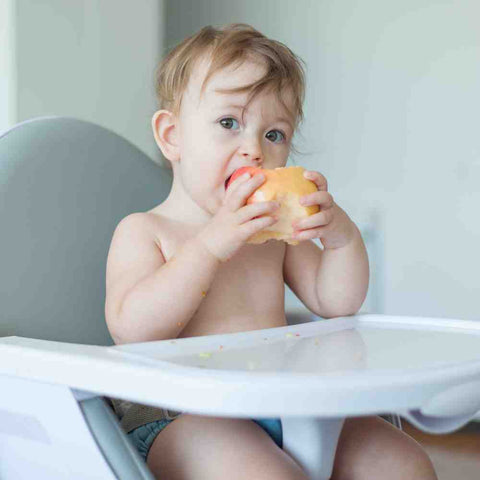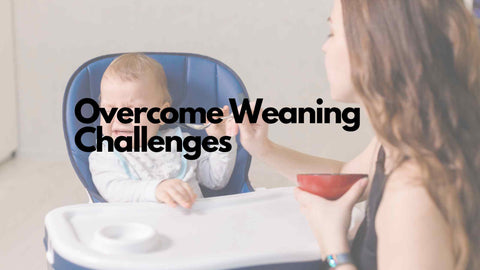How do I know if my baby has food allergies?
As a parent, it is important to keep an eye out for any signs of food allergies that your baby may be experiencing. Food allergies can range from mild to severe, and can even be life-threatening in some cases. Knowing how to identify, prevent and live with food allergies can help you keep your little one safe and healthy.How to tell if your baby has any food allergies
When weaning your baby, introducing new foods can be exciting. However, it is important to remember that some babies may have food allergies. These can develop naturally, or as a result of a family history of allergies, and there are lots of foods that can cause them. The most common food allergies are:- Cow's Milk
- Eggs
- Peanuts
- Tree Nuts (such as almonds, cashews, walnuts, etc.)
- Wheat
- Soy
- Fish
- Shellfish (such as shrimp, lobster, crab, etc.)
- Sesame seeds
- Corn
As with any foods that are new to your little one’s diet, it’s best to introduce these gradually and be aware of any reactions. Food allergies can cause the body to react in a number of ways, so keep a close eye on any changes after eating.
Common indicators of food allergies
To identify whether your child has any food allergies, look out for these common indicators:
Skin reactions: If your baby develops a rash, hives or other skin reaction after eating a specific food, it may be an allergic reaction. Rashes or hives can appear anywhere on the body and can be mild or severe.
Swelling: Another common reaction to food allergies is swelling of the face, lips, tongue or throat. Swelling of these areas can be especially dangerous as they can obstruct airways.
Vomiting and diarrhea: An allergic reaction to food can cause your baby to vomit or have diarrhea shortly after eating.
Coughing or wheezing: If your baby starts coughing or wheezing while eating, it could be a symptom of an allergic reaction. Wheezing is a sign that the airways are narrowing, which can be extremely dangerous and requires immediate medical attention.
Abdominal pain or cramping: These symptoms can be quite painful for your baby and can cause fussiness and irritability. If they seem to be in more pain after eating a particular food, there’s a chance it’s an allergic reaction.
Difficulty breathing: If your baby experiences breathing difficulties after eating, seek emergency medical attention immediately. This symptom is an indicator of a severe allergic reaction called anaphylaxis, which can be fatal if left untreated.
If you notice any of these symptoms of food allergies after introducing new foods to your baby, it is essential to stop feeding the food immediately, and seek medical attention if the symptoms persist or worsen.
Living with food allergies
If your little one does have any food allergies, don’t panic! They’re more common than many of us realise, and millions of people around the world have found a way to live happily with their allergies. In fact, according to the Food Standards Agency, an estimated 2 million people are living with diagnosed food allergies in the UK. Like any allergy, it just requires a few changes to you and/or your child’s lifestyle.Luckily, we live in a time when more and more places are catering to food allergies. Most supermarkets now have entire ‘free from’ aisles, and many restaurants are happy to make the necessary adjustments if you ask them. With some dietary changes, extra vigilance when out and about, and medication to hand just in case, there’s no reason why your little one can’t continue to be happy and healthy!
If you’re lucky enough to have no food allergies in your own household, it’s still a great idea to teach your kids about them. As your little one grows and starts to interact with others, there’s a high chance they’ll come across someone who does have an allergy. You can help your fellow parents by teaching your child about the dangers of sharing food. They can also learn by watching your own kindness and consideration for others.
Is bamboo tableware hypoallergenic?
If you notice an allergic reaction in your baby, you may start to worry about other products and materials they come into contact with. To ease your concerns, you can get hypoallergenic tableware to use during weaning.Our bamboo tableware is made from naturally hypoallergenic bamboo, meaning it is unlikely to cause an allergic reaction in babies who are prone to allergies or sensitive skin. It is a sustainable and eco-friendly alternative to traditional materials, offering several benefits, including low environmental impact, exceptional durability, and easy maintenance.
To find out more about the different hypoallergenic bamboo tableware options available, visit our shop. Or, if you’d like to check out more parenting tips and advice, you can visit our blog.





Comments (0)
There are no comments for this article. Be the first one to leave a message!